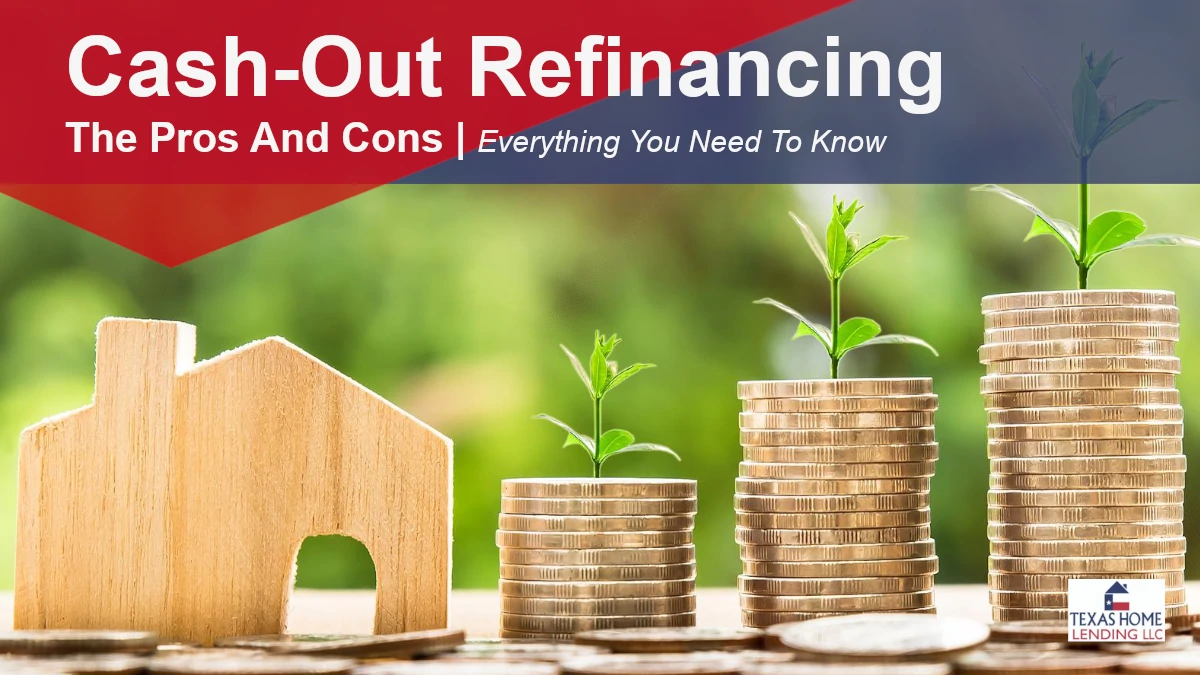Cash-Out Refinancing – The Pros And Cons
When considering cash-out refinancing options for your home, there are many things to keep in mind. We get it. It’s a huge financial decision for most people and you want to be fully informed before signing up. In this article, we will go over what cash-out refinancing is and weigh the pros and cons of cash-out refinancing so you can make an informed decision for your future.
What Is Cash-out Refinancing?
If you’ve heard the term before but need some clarification. You are in the right spot. Cash-out refinancing is a mortgage refinance option that allows you to draw cash directly out of your home loan to use for almost anything. It is essentially trading your home equity for liquid funds.
How Does Cash-out Refinancing Work?
If you’ve paid off a fair amount of your original mortgage then cashing out is a great option if you need to pay off some debt, make much-needed home repairs or even go back to school. The versatility of this option can be useful. To cash out on your home equity you will be looking at taking out a bigger mortgage than what you currently hold on your property. Then you are allowed to draw the difference in cash funds to use for whatever you’d like.
For example, if you owe $100,000 on a $250,000 house, you could refinance for $150,000 and take $50k in cash. Simple math right?
NOTE: Most lenders will deny your application if your cash-out draw would cause your home equity value to drop below 20%.
The Pros of Cash-out Refinancing
There are so many possibilities of what you can do with cash-out refinancing funds – it’s almost endless. Let’s go over some of the benefits of this type of home loan.
Gain Access To Fast Cash
Gaining access to liquid cash is the biggest reason people choose cash-out refinancing as an option. Life circumstances are ever-changing and different for everyone. Paying off debt, starting a business, or taking care of a family emergency doesn’t have to be stressful.
End Up With A Better Loan Agreement
Refinancing in all its forms is about negotiating a better deal for both you and the lender. In this way, cash-out refinancing also seeks to come to better terms when upgrading your mortgage. When you look at refinancing you will want to specifically try to get a lower interest rate. In many cases, you can find a much better rate than your original mortgage depending on the amount of increase, payment history, and how much has been paid off.
So What Are The Cons Of Cash-out Refinancing?
While there are many advantages to this type of refinance option there are also some downsides that must be taken into careful consideration before taking on. Let’s go over a few:
Takes Longer To Pay Off Your Mortgage
Since you will be replacing your current loan with a bigger one it would naturally follow that the time to pay it off would also increase. If you originally had a 30yr loan and you had 13 years left to pay, you increased your loan by $50,000, then you’d be looking at an additional 5-10years of payments. This also means that you will pay more interest overall during your mortgage agreement.
A bigger loan also means larger payments depending on how many years you negotiate for. Be prepared to see an increase in your monthly rate proportional to the amount of cash you withdrew and the length of your new contract.
Giving Up Equity
When you draw cash from your upgraded mortgage you are essentially borrowing against the equity you’ve built into your home. This is something to consider when you take the cash-out option. If it is not an emergency, it is advised that whatever you take out of your equity is invested in increasing the overall value of the home.
For example one of the most common ways people use the cash-out option is to put an addition on their house or make needed repairs and upgrades. The result is a higher value home which makes your increased mortgage worth the investment of a couple more years of payments.
In Conclusion
Cash-out refinancing is a great option for those who have built a good credit line, and have paid off a majority of their balance. Many favorable terms can be reached if you are already set up for success. Remember just because you have equity does not mean you should draw from it just to get cash. Speak with your loan officer and financial advisor to find out what options are most suited to your needs.





